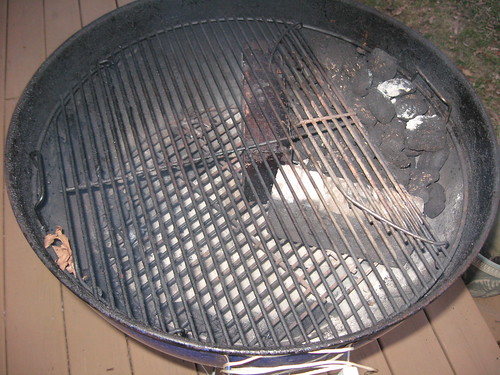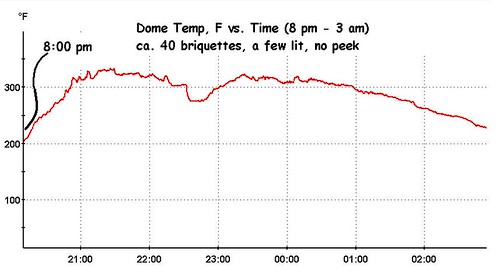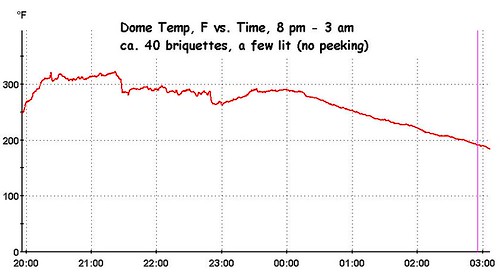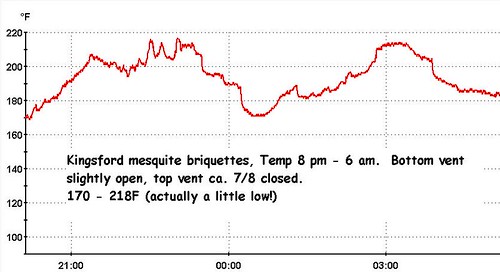While a scientist in industry, my toughest challenge was doing a control experiment. Receiving a procedure for development, the immediate urge is to read through it and start tweaking and changing immediately. That urge continues to this day. It's more exciting to try to improve things than start with a baseline/control.
I'll dispense with tedious details, but I've never done the mini minion method properly. Finally, I did. I've been wanting to let my kettle go overnight forever.
It's better to start these long cooking sessions the night before dinner. If started in the morning, cooking time can run short. If the meat's done a couple hours early, just wrap it up and no problems.
Here's few clean control runs.
1. The top image is a simple indirect setup; briquettes banked against the side using bricks to keep them in place.
2. The second image is the temperature profile using Kingsford's mesquite briquettes. I'm able to achieve a steady 200+ temp with a max around 320°F (acceptable) for 7 straight hours using only about 40 briquettes. Nice. No waking up at 3 am if I start at 11. Kettle has slightly opened vents on the bottom and half open vent on top.
3. The next is a run with nearly identical conditions to #2 but using "natural" Kingsford Competition briquettes. A tad less residual ash, but nearly identical temperature profile.
4. The 4th image shows one more run using a nearly closed top vent, everything else the same. This is pretty fascinating (to me). I've always had a hard time maintaining LOW temps with the kettle. In this case a relatively steady and controlled 195 ± 20°F is maintained for 10 straight hours using only about 40 briquettes. For low 'n slow, I actually need the top vent opened somewhere in between. That run will commence Saturday night when I cook beans beneath the brisket.
Sunday night's dinner will be a celebration of these efforts.
3.17.2009
Weber kettle mini minion method temperature profile for long burn
UPDATED with lots more tedious graphs!
Subscribe to:
Post Comments (Atom)










12 comments:
Very cool-pretty strong emperical evidence that 1) this method produces a very stable temperature pattern, and 2) it can be acheived in a kettle grill. Considering the fact the two most critical variables in cooking are temperature and time, this kind of information is priceless. I'd love to get one of those temperature probes, but would probably be horrified by the results from my stove.
Some other guys from that forum just informed me of some newer briquettes too that have less filler and hence less ash to potentially extinguish lit briquettes - and they have cleaner smelling burns. They are Cowboy Brand Stubbs and Kingsford Competition. They sound like lump charcoal in regular shapes. I can't wait to find some.
I bet your oven would be darn steady. I'll let you borrow the probe next time. I only use it once in a while.
That looks great, congratulations. Now you have to make something. How about a pork shoulder Yucatan style, I'll bring the hot sauce.
Cheers.
Thanks Mac, Got something better in mind. Brisket. And, that's not even the best part. Andrew gave me the idea. I'm using a "drip" tray beneath the brisket that will hold a nice pot of cannellini beans. They'll be nearly as good as the brisket. Starts tomorrow night.
The beans that's the good part, I did that once under a pork shoulder, pure love. I love brisket too, but I have never been able to do one proper in less than twelve hours. I'll be watching. Tomorrow I'm smoking shoulder that I cured for bacon. Andrew (the same guy as above) got me on a Scottish breakfast itch, so I'm making a Lorne sausage. But I needed some bacon to go with it. Oh the webs we weave...I'll be in CMH over Easter.
Cheers.
Hey Mac, I don't do brisket well, too impatient. That was the motivation to get it started overnight. I'm looking forward to the beans more than the brisket.
We (you, Andrew, Jim, Zach and Mary and myself) should try to get together when you're in town. Maybe go to Hoggy's, Pig Iron or City. I'll email everyone to see who's in town/interested.
Dave - Great, great write-up. So did you just start with 3-4 lit coals on top of the lit coals? I know I have always started with more...hmmmm.
I also like the ideas of using bricks. I really don't like using the weber charcoal baskets, but wasn't sure what I was going to replace them with. Now I know.
Now if I could just go to bed at night and not worry about critters taking over my grill!
Thanks Mike, I find this set of silly graphs incredibly satisfying.
I use a propane torch to light coals. I just blast a few on top. I don't use a chimney because I'm afraid of the few floating scraps of paper that float out. Just paranoid I guess.
And, I'm on a ravine with huge frigging racoons. Lots of 'em. They never got in the grill, don't know why.
Tried this last night. Got around 6 hours. If you are planning to go longer, do you just feed more coals, or do you load the whole thing up a second time?
Hate to comment on such an old one, but you just saved me CASH!....i was going to buy this 'Accessorie' and i found this DOH! this is way less expensive and has data to substantiate. Thank you!
Never too old to comment, thanks for visiting and so glad it helped.
I maintain a steady 250-300 Degree Temperature In My 22.5" Weber By Laying out a full chimney of briquettes in a semi circle on the opposite side of the grill from the food. then I remove 7-10 briquettes, put them in the chimney, light them up till all ashed over. then I position them on one side of the semi circle. This will allow the fresh coals to light as the old ones die out 4 hour ribs take 1/2 to 2/3 of the semi circle. when I'm done I simply separate the UN burnt coals form the burning and allow the coals to die out. works like a charm.
Post a Comment